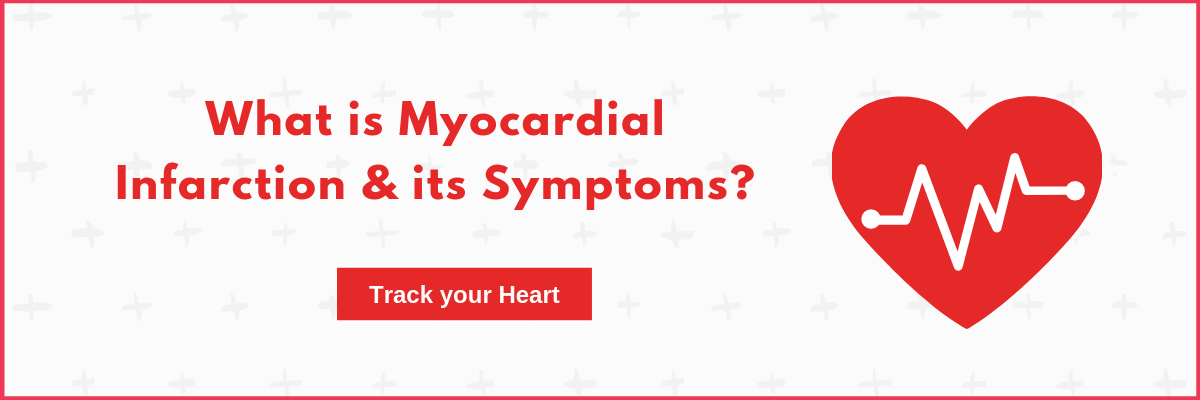

call us:1800 5999 5999
+91 72 0005 0005
What is Myocardial Infarction & its Symptoms?
Posted on July 5, 2019
In the last 25 years, India is among the countries that have witnessed an alarming rise in the incidence of heart disease. According to a series of new studies, the prevalence of heart disease has increased by over 50 percent from 1990 up to now. In fact, a heart attack is among the leading individual cause of deaths in India.
What is myocardial infarction?
Myocardial infarction, also known as a heart attack, is the permanent damage to the muscles of the heart. “Myo” means muscle while “cardiac” means the heart. “Infarction” on the other hand means the death of a certain tissue due to the lack of blood supply. For that reason, myocardial infarction is the medical term used to refer to a heart attack. Generally, myocardial infarction is a life-threatening medical condition which usually occurs when the flow of blood to the heart is cut off abruptly, leading to tissue damage.

Causes of myocardial infarction
Normally occurs when one or several coronary arteries are blocked. Your coronary artery can become narrow due to the build-up of various substances like cholesterol. When a heart attack occurs, one of the plaques can lead to the dropping of cholesterol or any other substances into the patient’s bloodstream. When this happens, a blood clot forms at that area and if it is large enough, it can block the smooth flow of blood through your coronary artery. As a result of this, the heart muscles would become starved of oxygen and other important nutrients.
When a heart attack occurs, you may either experience a complete blockage or just have a partial blockage. If it is completely blocked, it means that you have had an ST-elevation myocardial infarction. However, if it is a partial blockage then it is said that you have had a non-ST elevation myocardial infarction. Heart attack can also happen when a spasm of a coronary artery shuts down the flow of blood to a certain part of the heart muscle. This normally happens due to the regular use of drugs such as tobacco and cocaine.
Symptoms of myocardial infarction
Patients who have suffered myocardial infarction can experience a wide range of signs and symptoms. However, not all people having heart attacks tend to experience the same symptoms or severity of the symptoms. While some people may experience mild pain, there are others who may experience more severe pain. Consequently, some may experience no symptoms at all while for others the first sign could be a sudden cardiac arrest. The most common signs and symptoms of a heart attack include:
- Pressure or a squeezing sensation in your chest
- Nausea
- Indigestion
- Heartburn
- Running short of breath
- Cold sweat
- Fatigue
- Light headedness, dizziness, extreme weakness
Women’s Symptoms Sometimes Differ While most men and women will generally have symptoms related to chest pain, women are more likely to experience unusual symptoms. Some women who have less typical heart attack symptoms have reported symptoms like:
- Pain in the shoulder or upper back
- Pain in your jaw or a pain that spreads to the jaw
- Pain or pressure at the central part of your chest
- Light headedness
- Pain that spreads to the arm
- Unusual fatigue that continues for several days
When to see a doctor?
When you realize that you have chest pain or experience any other symptoms related to a heart attack that lasted for more than five minutes, you should never ignore. It is advisable for you to seek emergency care early enough so that you can rule out a heart attack. In addition to this, you should also
- Learn to identify the common signs and symptoms of heart disease. The presence of heart diseases may be a warning sign of a possible heart attack. To monitor your heart for heart disease, you can go for a wearable bio-sensor which will accurately monitor your heart
- Gets a physical exam of your whole body including screening for various heart disease risk factors
- If you have symptoms that persist, you should consider seeking a second opinion. The more symptoms you will have, the greater will be the likelihood that you may be having a heart disease
Prevention
You should ask your doctor how often you will need to be monitored. It is advisable to consider a Holter monitor to help monitor your heart. Some of the benefits of monitoring your hear using a Holter monitor include:
- It is comfortable to wear even for extended periods of time
- Can be worn comfortably by both men and women for an extended period of up to 7 days
- You can continue with your everyday activities even after wearing remote cardiac monitoring
- You will have 24/7 access to comprehensive clinical reports from anywhere from the secured cloud portal
- There is an in-built event notification feature that is patient-initiated for better diagnostic
- It offers continuous ECG monitoring service of all your activities and stress levels which are often related to heart events and cardiac arrhythmia